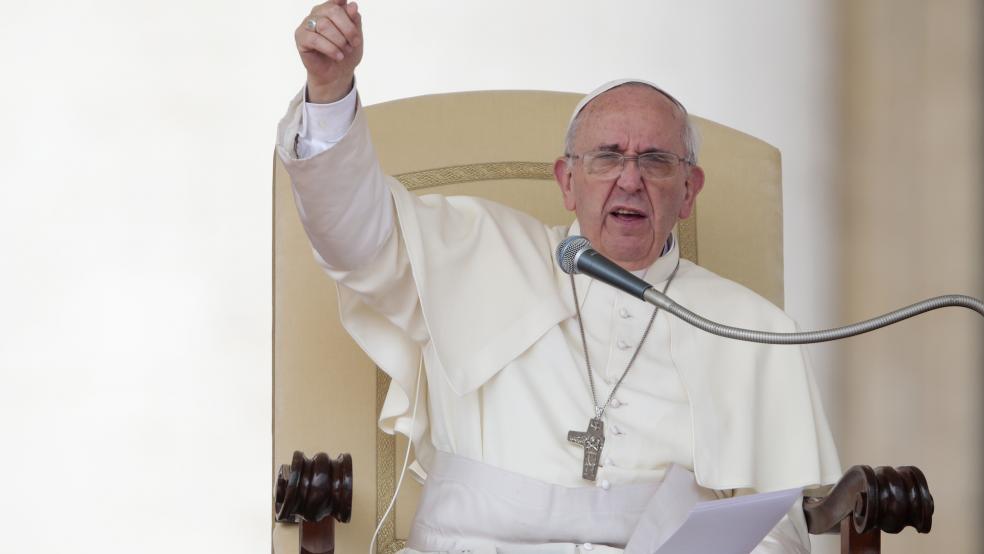Pope Francis attacked unfettered capitalism as "a new tyranny" and beseeched global leaders to fight poverty and growing inequality, in a document on Tuesday setting out a platform for his papacy and calling for a renewal of the Catholic Church.
The 84-page document, known as an apostolic exhortation, was the first major work he has authored alone as pope and makes official many views he has aired in sermons and remarks since he became the first non-European pontiff in 1,300 years in March.
In it, Francis went further than previous comments criticizing the global economic system, attacking the "idolatry of money," and urged politicians to "attack the structural causes of inequality" and strive to provide work, health care and education to all citizens.
Related: Pope Francis Says Unemployed Need to Fight for Work
He also called on rich people to share their wealth. "Just as the commandment 'Thou shalt not kill' sets a clear limit in order to safeguard the value of human life, today we also have to say 'thou shalt not' to an economy of exclusion and inequality. Such an economy kills," Francis wrote in the document issued on Tuesday.
"How can it be that it is not a news item when an elderly homeless person dies of exposure, but it is news when the stock market loses 2 points?"
The pope said renewal of the Church could not be put off and said the Vatican and its entrenched hierarchy "also need to hear the call to pastoral conversion." "I prefer a Church which is bruised, hurting and dirty because it has been out on the streets, rather than a Church which is unhealthy from being confined and from clinging to its own security," he wrote.
Italian theologian Massimo Faggioli greeted the work as "the manifesto of Francis" while veteran Vatican analyst John Thavis called it a "Magna Carta for church reform."
"The message on poverty sets Pope Francis on a collision course with neo-liberal Catholic thought, especially in the United States," said Faggioli, an expert on the Second Vatican Council and reform in the Catholic Church. Other Catholic analysts added that progressive streams in the Church would bristle at the document's rejection of women priests, though it leaves open the door to women taking other "decision-making" positions in the Church.
Simple Style
In July, Francis finished an encyclical begun by Pope Benedict but he made clear that it was largely the work of his predecessor, who resigned in February. Called "Evangelii Gaudium" (The Joy of the Gospel), the exhortation is presented in Francis' simple preaching style, distinct from the more academic writings of former popes, and stresses the Church's central mission of spreading the gospel.
A meditation on how to revitalize a Church suffering encroaching secularization in the West, the exhortation echoed the zeal often heard from evangelical Protestants who have won over disaffected Catholics in the pope's native Latin America. In it, economic inequality features as one of the issues Francis is most concerned about, and the 76-year-old pontiff calls for an overhaul of the financial system and warns that unequal distribution of wealth inevitably leads to violence.
Denying it was simple populism, he called for action "beyond a simple welfare mentality" and added: "I beg the Lord to grant us more politicians who are genuinely disturbed by the state of society, the people, the lives of the poor."
Since his election, Francis has set an example for austerity in the Church, living in a Vatican guest house rather than the ornate Apostolic Palace, travelling in a Ford Focus, and last month suspending a bishop who spent millions of euros on his luxurious residence. He chose to be called "Francis" after the medieval Italian saint of the same name famed for choosing a life of poverty.
Munich Cardinal Reinhard Marx, one of eight special papal advisers, said the pope aimed his criticism at modern society "but also at the Church itself, which is always tempted to look inward and betray its mission of evangelization."
Stressing cooperation among religions, Francis quoted the late Pope John Paul II's idea that the papacy might be reshaped to promote closer ties with other Christian churches and noted lessons Rome could learn from the Orthodox such as "synodality" or decentralized leadership.
He praised cooperation with Jews and Muslims and urged Islamic countries to guarantee their Christian minorities the same religious freedom as Muslims enjoy in the West.
With additional reporting by James Mackenzie and Tom Heneghan of Reuters.




